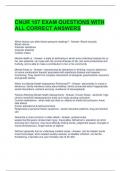CNUR 107 EXAM QUESTIONS WITH
ALL CORRECT ANSWERS
Which factors can affect blood pressure readings? - Answer- Blood viscosity
Blood volume
Vascular resistance
Vascular elasticity
Cardiac output
Mental Health is - Answer- a state of well-being in which every individual realizes his or
her own potential, can cope with the normal stresses of life, can work productively and
fruitfully, and is able to make a contribution to her or his community
Mental illness is - Answer- characterized by alterations in thinking, mood or behaviour
(or some combination thereof) associated with significant distress and impaired
functioning. They result from complex interactions of biological, psychosocial, economic
and genetic factors
When Is a Mental Health Assessment Performed?? - Answer- abnormality in mood or
behaviour, family members notice abnormalities, family concerned about inappropriate
social interactions, extreme worrying, avoidance of issues/people
Factors Affecting Mental Health Assessments - Answer- Known illness - alcoholic, high,
chronic renal/liver diseases(toxins build up in body causing confusion)
Current medications - what meds are they on, elderly on meds that confusion, know
side effects
Known educational & behavioral level
Responses to personal history questions - social interaction patterns, drug and alcohol
use
Dementia is more common in older adults - Answer- gradual onset
weeks/months/years, stroke brain injury, irreversible, Alzheimer's, alteration sin short
and long term memory, may have difficulty finding words, judgement issues, changes in
mood and behaviour, forget names of objects
Delirium generally has an underlying medical cause - Answer- can be treated, acute
onset hours/days, when treated usually resolves, ex bladder infection, can be life-
threatening, if persists one year mortality rate of 35-40%
, Some cues the pt may have dementia - Answer- seems disoriented, is a "poor
historian", defers question to family members, repeatedly and apparently unintentionally
fails to follow instruction, difficulty finding right words, inappropriate or incomprehensible
words, difficulty following conversation
Depression - Answer- Includes cognitive and physical changes, trouble concentrating,
disturbed sleep many hours or no sleep, decreased energy, decrease or inc in appetite,
to be medically diagnosed symptoms need to be present with 2 weeks or longer but not
after current serious event, common in older adults cuz more than one medical
diagnosis
Mental Health & Older Adults - Answer- It is NOT normal for mental health to deteriorate
with age!!!
Increases in time for the brain to process = increase in response times
Recent memory tends to decrease with aging
Sensory Loss tends to occur (vision, Hearing - high frequency sounds) - not common,
leads to social isolation, suspicious feelings, social withdrawal, depression, frustration,
appear to be confused
What sort of things will this affect in your interactions with older adults?? - Answer-
Repeat self, write it down, 24hr diet recall, re-evaluate teaching with pt make sure they
understand
Methods of Mental Health Assessment: Observations - Answer- - done at different times
of day, hygienic information, facial expressions, gestures, Interviewing - developing
trust, build rapport, Examination - mini mental health assessment, Physical Assessment
- BP, vital signs etc, Collaboration - talk with family, other HCP working with pt
ABCT's - Answer- assess during interview, observation, physical assessment,
examination, maybe collaboration
-appearance, behaviour, cognitive, though process/content/perception
A of ABCT - Answer- Overall Appearance - dress, weight, asymmetrical movement,
facial twitching, slow movements, oral
Posture - standing sitting, relaxed curled up
Movement - voluntary, deliberate coordinated smooth even
Hygiene/Grooming - hair, teeth, cleanliness, skin colour, body odor, unkempt, compare
one side of body to other like a stroke
Dress - clean, appropriate seasonally, age & gender appropriate, fit, eccentric dress
bizarre makeup
B of ABCT - Answer- Level of Consciousness - awake, alert, aware of environment,
appropriate response to stimuli, know themselves, eye contact, facial expression
Speech - rate/pace, volume, quantity,
Facial Expression - appropriate to situation, change when topic changes,
Mood & Affect - mood is what pt tells you, affect is their actions, are they congruent?




